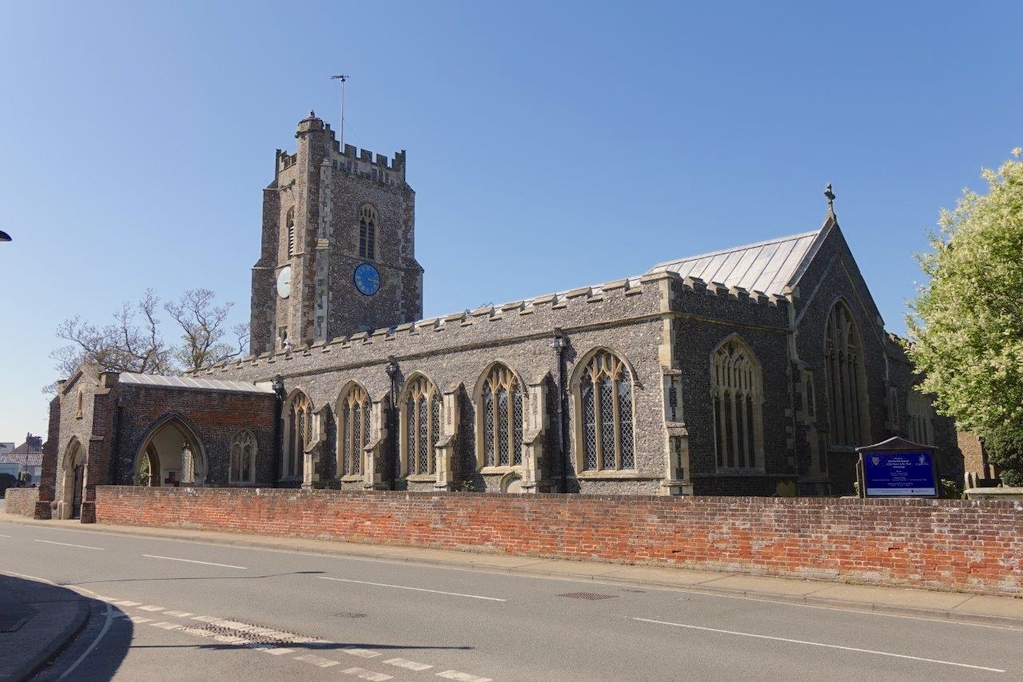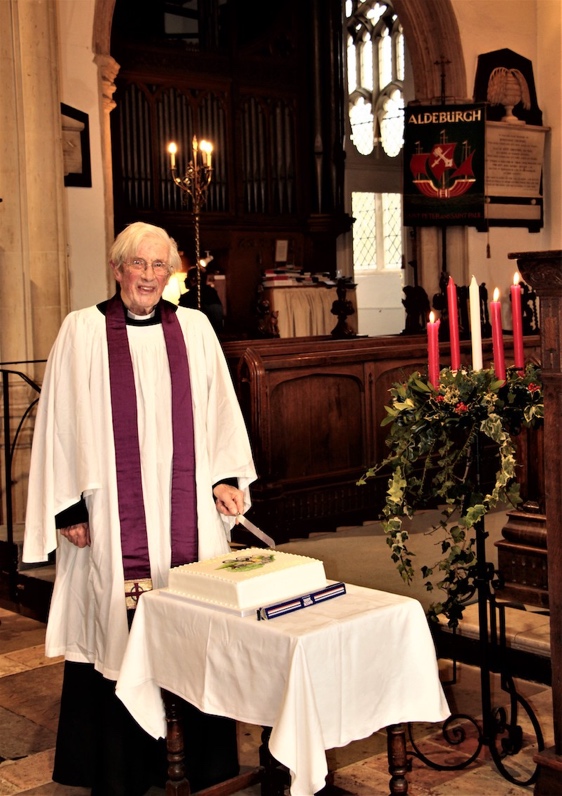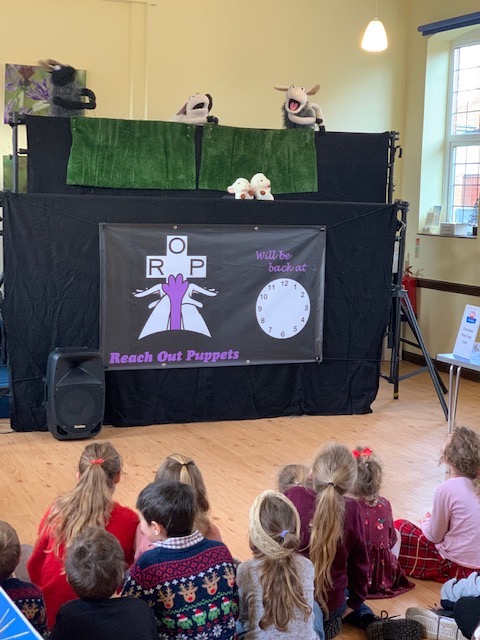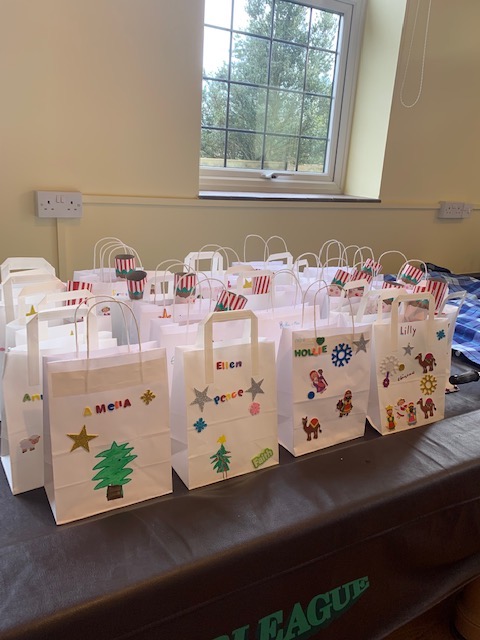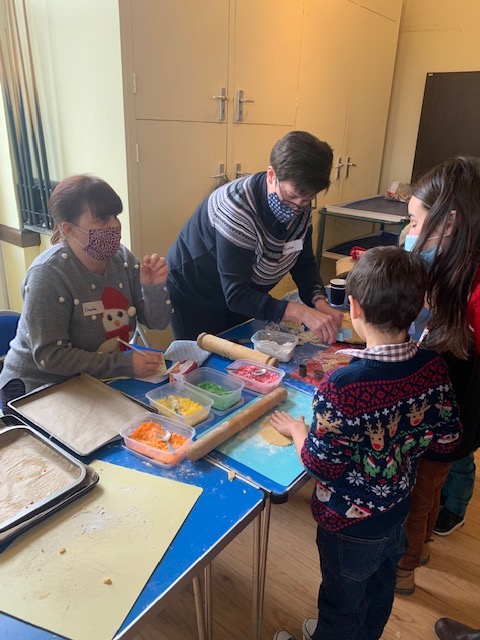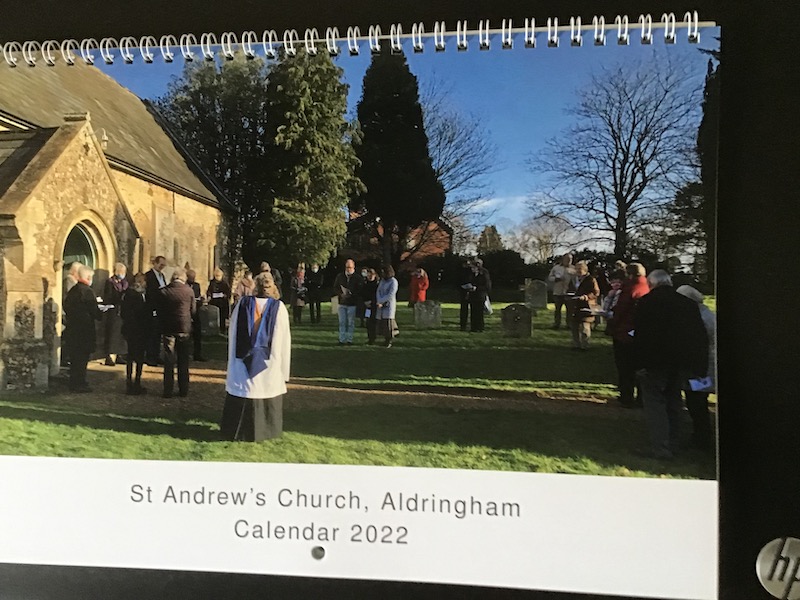Message from our Curate in Charge,
The Revd James Marston
At one of the carol services I have been attending across the benefice – I heard the famous poem by Sir John Betjeman – Christmas (see below).
Betjeman always strikes a resonance with me, and I especially enjoy his poems about the Church of England – for which he held a great passion.
Last Sunday we celebrated Canon John Giles’ remarkable 60 years in ministry – and we include his fascinating sermon in this week’s newsletter. I am at the other end of that journey, a mere whippersnapper in terms of length service. I hope that in time I too will be able to look back not only on change and innovation but also on constancy and consistency of faith, worship and devotion.
However much The Church of England evolves and changes, it seems to me it still remains the same – its foundation based on a faith and belief in the divine and human Jesus Christ, the son of God.
It is the arrival of Jesus Christ in the world, and the promise He brings of eternal life that we celebrate this week at Christmas.
Indeed, at is root Christmas is a reminder of simple yet profound fact which has transformed the lives of Canon John, me, you, and countless others over the arc of 2000 years.
As we continue to keep and share the faith, through whatever our lives and times throw at us, let us celebrate the promise of eternal life this Christmas with joy in hearts all for that God has done for us and all that he will do for us in the years to come.
Christmas by Sir John Betjeman
The bells of waiting Advent ring,
The Tortoise stove is lit again
And lamp-oil light across the night
Has caught the streaks of winter rain
In many a stained-glass window sheen
From Crimson Lake to Hookers Green.
The holly in the windy hedge
And round the Manor House the yew
Will soon be stripped to deck the ledge,
The altar, font and arch and pew,
So that the villagers can say
‘The church looks nice’ on Christmas Day.
Provincial Public Houses blaze,
Corporation tramcars clang,
On lighted tenements I gaze,
Where paper decorations hang,
And bunting in the red Town Hall
Says ‘Merry Christmas to you all’.
And London shops on Christmas Eve
Are strung with silver bells and flowers
As hurrying clerks the City leave
To pigeon-haunted classic towers,
And marbled clouds go scudding by
The many-steepled London sky.
And girls in slacks remember Dad,
And oafish louts remember Mum,
And sleepless children’s hearts are glad.
And Christmas-morning bells say ‘Come!’
Even to shining ones who dwell
Safe in the Dorchester Hotel.
And is it true? And is it true,
This most tremendous tale of all,
Seen in a stained-glass window’s hue,
A Baby in an ox’s stall ?
The Maker of the stars and sea
Become a Child on earth for me ?
And is it true ? For if it is,
No loving fingers tying strings
Around those tissued fripperies,
The sweet and silly Christmas things,
Bath salts and inexpensive scent
And hideous tie so kindly meant,
No love that in a family dwells,
No carolling in frosty air,
Nor all the steeple-shaking bells
Can with this single Truth compare –
That God was man in Palestine
And lives today in Bread and Wine.
Holy Communion
In the light of current concerns and following discussions with clergy colleagues and other, we have decided we won’t be offering the consecrated communion wine chalice to the congregations for the foreseeable future.
The priest presiding will continue to consecrate a small amount and consume it on behalf of the congregation.
I would remind you that receiving just one form of the sacrament remains a valid communion. I will consult again on this with the PCCs in January but until then we won’t be offering the chalice at services in the benefice.
I wish you all a very merry and peaceful Christmas and happy and safe 2022
James
|
Funeral arrangements for Anne Surfling RIP Thoughts and prayers are with Pam at this time. May Anne rest in peace and rise in glory. Amen.Revd.Jo Mabey |
Collect
God our redeemer,
who prepared the Blessed Virgin Mary
to be the mother of your Son:
grant that, as she looked for his coming as our saviour,
so we may be ready to greet him
when he comes again as our judge;
who is alive and reigns with you,
in the unity of the Holy Spirit,
one God, now and for ever.
First Reading
Micah 5.2-5a
But you, O Bethlehem of Ephrathah, who are one of the little clans of Judah, from you shall come forth for me one who is to rule in Israel,
whose origin is from of old, from ancient days. Therefore he shall give them up until the time when she who is in labour has brought forth;
then the rest of his kindred shall return to the people of Israel.
And he shall stand and feed his flock in the strength of the Lord,
in the majesty of the name of the Lord his God. And they shall live secure, for now he shall be great to the ends of the earth; and he shall be the one of peace. If the Assyrians come into our land and tread upon our soil,
we will raise against them seven shepherds and eight installed as rulers.
Second Reading
Hebrews 10.5-10
Consequently, when Christ came into the world, he said, ‘Sacrifices and offerings you have not desired, but a body you have prepared for me;
in burnt-offerings and sin-offerings you have taken no pleasure. Then I said, “See, God, I have come to do your will, O God” (in the scroll of the book it is written of me).’ When he said above, ‘You have neither desired nor taken pleasure in sacrifices and offerings and burnt-offerings and sin-offerings’ (these are offered according to the law), then he added, ‘See, I have come to do your will.’ He abolishes the first in order to establish the second. And it is by God’s will that we have been sanctified through the offering of the body of Jesus Christ once for all.
Gospel Reading
Luke 1.39-55
In those days Mary set out and went with haste to a Judean town in the hill country, where she entered the house of Zechariah and greeted Elizabeth. When Elizabeth heard Mary’s greeting, the child leapt in her womb. And Elizabeth was filled with the Holy Spirit and exclaimed with a loud cry, ‘Blessed are you among women, and blessed is the fruit of your womb. And why has this happened to me, that the mother of my Lord comes to me? For as soon as I heard the sound of your greeting, the child in my womb leapt for joy. And blessed is she who believed that there would be a fulfilment of what was spoken to her by the Lord.’ And Mary said, ‘My soul magnifies the Lord, and my spirit rejoices in God my Saviour, for he has looked with favour on the lowliness of his servant. Surely, from now on all generations will call me blessed; for the Mighty One has done great things for me, and holy is his name. His mercy is for those who fear him from generation to generation. He has shown strength with his arm; he has scattered the proud in the thoughts of their hearts. He has brought down the powerful from their thrones, and lifted up the lowly; he has filled the hungry with good things, and sent the rich away empty. He has helped his servant Israel, in remembrance of his mercy, according to the promise he made to our ancestors, to Abraham and to his descendants for ever.’
Canon John Giles 60th Ordination Anniversary
On the 12th December we celebrated with John to mark this great milestone in his ministry. John would like to thank you all that attended this service, and for your kind words, and all the arrangements made
(inc THE CAKE!). It meant a great deal to John.
|
|
|
Sermon by Canon John Giles
Preached on Sunday 12th December 2021
In the name of the Father, and of the Son, and of the Holy Spirit. Amen.
This is a celebration sermon, to give thanks to Almighty God for sixty years of service in the ordained ministry in the Church of England. I have been pressed to say a word about why I ever set out on the road to ordination. There were several things that happened when I was still at school.
I had always felt that there was a reality behind God language. Prayer and worship were never a problem for me. Even Brian Cox talking about black holes doesn’t stop me feeling that behind the mystery of the universe there is value and meaning, and that the job of religious faith is to relate to this in word and action. The discovery of Jesus was a major breakthrough. Confirmation at nearly 16 was deeply meaningful.
At school I saw two enemies become friends through Christian forgiveness. And I realised that Christianity worked.
Then I went on visits to a working-class parish in downtown Portsmouth and discovered two things 1. The happiness and joy of High Church worship in the life of an Anglo-Catholic parish, and 2. what an incredibly restricted social world I had been brought up in. When later a school chaplain made the case for the church ministering in large urban areas, housing estates etc, I felt quite simply “Why shouldn’t I do that?”. All this was confirmed in the first few months of National Service. And that’s about it.
In my end is my beginning. I’m back to the subject of our gospel today John Baptist whom I encountered long before I knew anything about Jesus. I was nine. My father was striding down Beaulieu Abbey Church as JB, declaiming “Repent ye, repent ye – the Kingdom of Heaven is at hand”. “You brood of vipers” he had said. “Who warned you to flee from the wrath to come?”
In Godspell we heard the same message: THEME ON TRUMPET STOP Prepare ye the way of the Lord.
The Baptist’s teaching wasn’t revolutionary. It was good Ten Commandments stuff: Feed the hungry; share with the poor; don’t defraud others; don’t profiteer. We could do with that today. Fraud is everywhere.
At the same time John said: Look into your own hearts. Change your own ways. Make a fresh start. Repent and be baptised.
John was a man of principle. He would die in prison for protesting against Herod Antipas’ immorality. Yet he was no prig, standing on his own dignity. When his cousin Jesus came to the Jordan he saw that Jesus would be taking his own work and ministry far beyond where he was at that moment. John was the forerunner. He would prepare the way. There is a great humility here.
Jesus’s new understanding of God’s message has to start from a moral base. The Ten Commandments still stand. They used to be written up in many churches. Is the time right for a reaffirmation of the Ten Commandments?
Jesus is baptised, and takes Baptism into his own ministry, and so, down to us.
What was different about Jesus’ ministry, because this is what we have to take out to people today? You find it in the Sermon on the Mount, in St. Matthews Gospel, chapters 5,6, and 7. The bedrock of the SM is the message of God’s love for every person, good or bad.
Basically, he was teaching and healing: In the light of divine love, people saw he could untangle their knotted souls. He knew the destructive force of GUILT. He gave people a way to find forgiveness.Many of Jesus healings end with a promise of forgiveness. He was still forgiving on the cross. We have been thinking of the words “Father Forgive” in the bombed out ruins of Coventry Cathedral, and the ministry of international reconciliation that flowed out from there. AB Desmond Tutu put it: “Forgiveness is the way we heal the world. The process is simple, but it isn’t easy”. Christian worship recalls us to penitence and the promise of forgiveness. “Why do you talk about the speck of dust in your brother’s eye but fail to notice the log in your own”. If the church doesn’t say this, where else will you find it, not in Prime Minister’s Question Time, excepting the creepy apologies.
Back to Baptism, and what the church is here to do in its ministry. Exactly sixty years ago today I started as a deacon in North Lowestoft. We had a huge housing estate from which eighty or so children came to Junior Church every Sunday – and there were lots of baptisms & weddings. The church had a ministry of blessing. How things have changed. William Temple said “The church is the only society that exists for those who are not its members”.
As a Curate I was put i/c of a rundown daughter church. We had a Fair for Oxfam. One of the boys in the Sunday School had won a new leather football at his school. It was very precious to him. He gave it as a prize for the Raffle. I still admire his generosity. The money raised by the Fair astonished everyone. St. Andrew’s Church was alive again. (Perhaps the reason for the energising effect the Fair had on the church was that the money was being raised by a basically poor, run down church, for others. For once the church wasn’t raising money for itself.)
We invented a new Nativity Play with a part for Roman soldiers to harry the peasants on their way to Bethlehem. It gave the difficult boys a chance to make swords which they enjoyed.
What were we trying to do? Trying to build up a bit of community, in church terms Kingdom-building, built into the worship and life of a living family, in the church.
In the summer of 1965, the Bishop of Norwich wrote, asking me to go to the new University of East Anglia as their first full time Chaplain. I would remain a diocesan clergyman, representing the C of E, but be recognised within the University
As far as religion in the university was concerned the only official marker laid down was that if any students (or staff for that matter) wished to worship, they should do so in the churches of the town. This was also the view of the Archdeacon of Norwich who had a number of redundant churches in the city centre to worry about. He wanted the chaplain to be also in charge of a suitable redundant church which could be redecorated and maintained by willing student volunteers from the University. Just imagine the photo-opportunities and happy coverage such activity would get from the local press and even more the church press. Awkwardly however, I saw straight away that in spite of the obvious attractions of having such a base, given that nothing of the sort was available on university premises, if the life of any future church community in the university were to be authentic, it had to find its own expression in the university itself. The possibility of taking over a redundant church in the town therefore had to be firmly rejected. Fortunately, Bishop Fleming immediately accepted this.
I didn’t want to form a little club of Anglicans. We settled for a very loose framework: “The Church of England in the University”. An ever-lengthening mailing list of students and staff emerged who I felt were either already on side, or who might be, or who were openly opposed to the idea of any religious presence at all in the University, but who, in that case, ought at least to know what was going on.
No one knew what the place of religion in a brand new university would or should feel like. To use a sailing metaphor, I was sailing by the seat of my pants, reacting instinctively to the challenges, encouragements and setbacks as they arose day by day. If there was a word to sum up what I was trying to do it would have been AFFIRMATION – affirmation of the best in every member of the university community, affirmation of academic work, research, and study. Affirmation became “OFFERING UP” as we learned to worship in the university: offering up to God the work, study, and life we all had in common. The background therefore to our worship was the shared experience of those who already had a loyalty to the church, or who were beginning to discover that loyalty for themselves (and there were some) in the uncharted, largely but not entirely, secular waters of UEA.
I’m talking about the ministry of the Church – the church’s job in other words. I must pay tribute to the TEAMWORK of the Church of God. The wonderful Junior Church in Lowestoft was run by lay people, with youngsters as junior wardens. Incidentally this anniversary is one for Jill as well. Her loyal support and fiery critical faculties have been part and parcel of what I’ve been trying to do in the last 60 years. Today is also a 60th Anniversary for Jill of being a Vicar’s wife, though you must talk to her if you want to know about that.In UEA, those who spoke with the loudest voices didn’t speak for everybody by a long shot. Anti-religious feeling was vocal, very like the woke views being put around today. I won’t tell you of the time the Dean of Students kicked me out of the University canteen, or about the son of the Cambridge philosophy don, drinking the coffee I had bought for him, who told me brutally I was wasting my time.
I hadn’t been in the job for a week before the first issue of the student magazine came out with a full-page, brilliantly drawn cartoon of chaplains twirling up Gullible Students from a dish of student spaghetti.
The pro and anti religious views crystalised round the question of whether or not there should be some sort of chapel. It was a hard fought battle, which in the end, in a decisive vote in the University Senate, came down on the side of a non-specific Meeting Room for Worship in a building at the heart of the Campus, which contained also three offices for chaplains and a Common Room, where I once treated Ian McEwan to a cup of coffee. The building is now called a Multi-Faith Centre and the Meeting Room for Worship has become simply the Meeting Room. Nevertheless, it is there.
There came a time of protest and revolution in UEA 1971 – 1972. My job had been to love the students. By then the new Chaplaincy building had been opened. I lost quite a bit of love for the student body when I saw how they disrupted some exams and attacked the new Dean of Students. They destroyed both his job and his marriage. If anyone is interested in a much longer version of setting up the Chaplaincy in UEA, I can send them an account on email.
We moved to Kidbrooke, a large parish in SE London. It had three quite separate districts, one, on Blackheath, very posh. Glenda Jackson was our most famous resident. There was another large development, mainly semi-detached, part private, part council; and the huge concrete Ferrier Estate, newly built by the GLC, now pulled down.
20,000 people kept one busy. We had three members of staff and it was all hands to the pump. Apart from the usual demands: baptisms, weddings, funerals, there was a social apartheid dividing the three areas. The challenge was to build one church family from three such diverse backgrounds. Music helped. We had terrific musical support. Which ended in a production of Britten’s Noye’s Fludde with a hundred animals from local schools and the church choir which left a little girl crying at the end saying she wished it could have gone on for ever. The tea party that followed saw civil war breaking out between the children from the local schools and the few from private schools who had led the music. The ammunition was provided by the apple tree in the Vicarage garden. The net result however was a sense of achievement and indeed glory. The rainbow covered all.
We invented a new Community Knockout Competition for teams from all over the parish to compete on the playing fields of Thomas Tallis Comprehensive School. The Ferrier Estate for once was really included in the wider community. And it was their team that won the main prize. Happiness all round as stronger links between all groups in the parish were forged.
After seven years I was asked to apply for a job in Sheffield. With Engineering in my blood and a chance to get into industry, I applied and went to be Vicar of St. Mark’s Broomhill, with strong connections with the Hallamshire Hospital and the University. We had half a dozen Professors in the congregation and goodness knows how many PhDs. Everything was debated! It wasn’t easy. At Remembrance time, we had of course those who wore red poppies. Together with them were a number of white poppies to say they honoured the dead but disapproved of violence. Then there were those who courageously wore no poppies at all because they didn’t want to offend either the reds or the whites.
I did one afternoon a week with the Industrial Mission visiting Harris Miller, a down market cutlery firm, and later, Forge masters. The work force were welcoming to such a strange sight as a dog-collar in their factory. I enjoyed the day when some Somalians left behind in Sheffield at the end of World War II had a grievance and asked for my help. I said I wasn’t of their religious persuasion. “Yes” they said, “But you are our Imam after all”.
After some years, I was asked to join the Cathedral staff as a Residentiary Canon. Here was yet another ministry – City-Centre – where unknown people would come in to visit or join in a service, and never be seen again. There had to be a message for them in word or music. That was our ministry.
Cathedrals are privileged places. The Church Commissioners give hidden subsidies, and money does help. In return you get Cathedral music and well maintained, and often historic church buildings. But ministry is so much more than that if you’re in the right relationship to a city and in the right place. Sheffield Cathedral was the old parish church of the city, only recently upgraded to a Cathedral. My time coincided with two huge events – the Falklands War and the Hillsborough Disaster. In trouble people were drawn to what they knew as the Old Church for comfort, prayer and reflection.
Daily lunchtime prayers were held for those engaged in the Falklands conflict. Parents, friends, and relatives would be present, worried for the safety of their loved ones. HMS Sheffield, a large cruiser adopted by the City, was sunk on 2 April 1982. It brought it all very close to home.
After Hillsborough a Liverpool shrine of scarves, flowers and bobble-hats quickly appeared in the Cathedral. For at least a month there was a constant stream of mourners and two very large commemorative services. The Cathedral’s ministry was one of healing and reconciliation. As well as the broken-hearted, there were a lot of very angry people around.
The Cathedral was only a 5 year appointment and we moved finally back again to SE London, more Lewisham than Blackheath, to a parish that might at first seem unremarkable. Far from it. It had a wonderful spirit and great music. One of our choirs was a finalist in the Choirgirl of the Year Competition. One of our Youth Fellowship was on the Today programme just recently talking about pigs as a spokesman for vets in the North of England.
We were a mixed congregation racially. A West Indian Mum was worried sick about her son driving a new electricity van. She wanted the van blessed. So, after the service that day I took out a fire bucket full of water, blessed it, and flung it over the van with appropriate prayers. As far as I know it did the trick.
The Vicarage and the Vicarage garden were used constantly for play-readings, informal concerts, bonfire parties etc that brought in all sorts of people who were outside the church circle as such. But they all served to keep open the William Temple ideal that the church exists for those who are not its members.
And then there was retirement which was forced through sheer overwork. My last parish had included a small Church of England Comprehensive School, where I became Chair of Governors. This made heavy demands. For one reason and another time ran out and we decided to retire to Aldeburgh.
There has been plenty to keep us busy, especially after the departure of Tony Moore. Of that you must judge. It’s been more than 20 years, though the last 2 ½ years have been clouded by cancer and leukaemia., not to mention Covid which has put a damper on everything for us all.
Incidentally a big thank you here for those who have kept everything going. Typically, last night, going out at 6pm for a walk, I saw the lights on in the church and called in to find Church Warden Ken still getting things ready for today.
In those years England has moved slowly but steadily away from formal Christianity. But things come and go. The C of E is at a low point just at this moment. But there have been plenty of low points in Christian history in the past, and we do have two great forces on our side:
The first is the power of Love, the love of God which we shall see in action in a fortnight’s time at Christmas, – and the power of Christ’s love.
The second great force is that of the Holy Spirit – what happens when the church comes together in faith, prayer, and action.
And that is a burning FIRE, of which Charles Wesley wrote in his hymn “O thou who camest from above”. I told Nicky Winter I was having difficulty with this sermon, and she said, “Tell them what you’ve done, and give them encouragement.”
Well, this is the encouragement: to build up love in the life of the church, and to go forth with new ideas and fresh energy to fulfil new ministries in the strength of the Holy Spirit.
May God be with us all now and in the days to come. Amen.
Post Communion
Heavenly Father, who chose the Blessed Virgin Mary
to be the mother of the promised saviour:
fill us your servants with your grace,
that in all things we may embrace your holy will
and with her rejoice in your salvation;
through Jesus Christ our Lord.
Next WeekSunday 26th December
|
|
|
|
|
|
|
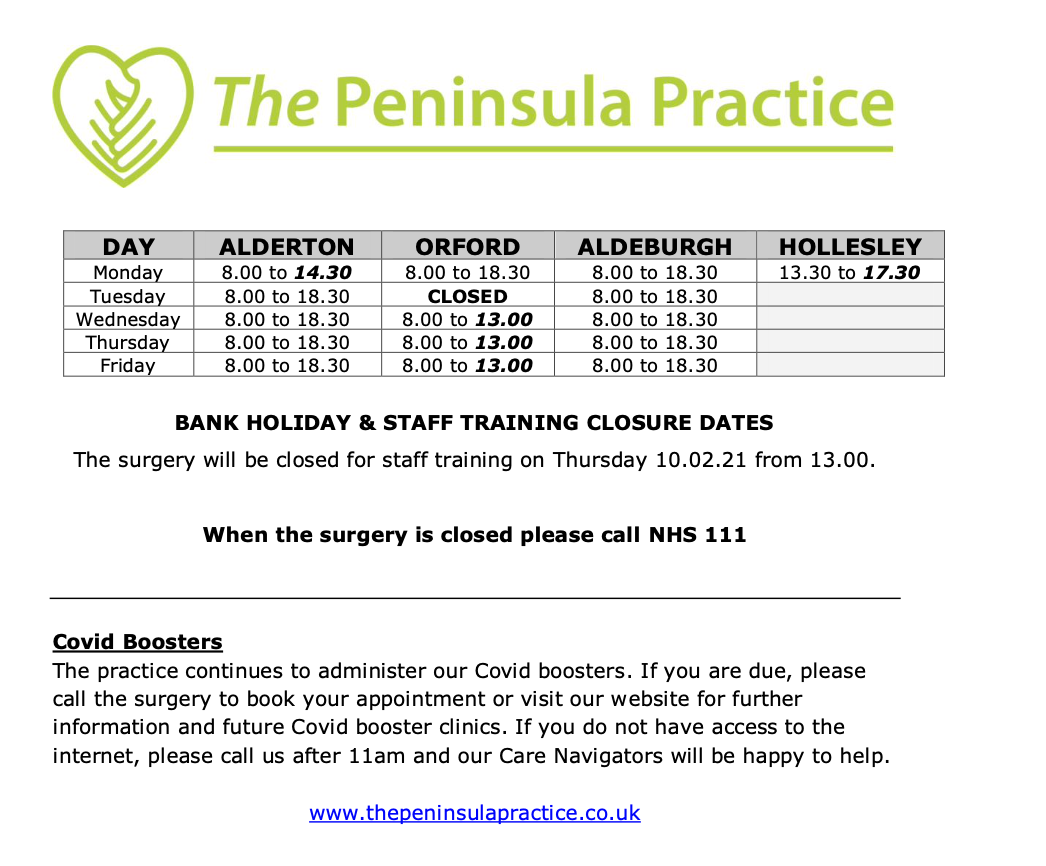
NOTICES
|
Church of England and Diocese Online Worship There are many online services you can view from the Church of England and our cathedral. Here are some links below. Church of England website https://www.churchofengland.org/ Church of England Facebook page Church of England YouTube channel https://www.youtube.com/ St Edmundsbury Cathedral Facebook Page |
|
Food Banks at the East of England Co-op Foodbanks provide a valuable service to those in need in our communities. The Aldeburgh Co-op and Solar in Leiston are doing a grand job in collecting food donations, which are collected regularly and distributed. So please look out for the various collection baskets. The Trussel Trust Organisation Food banks in our network have seen an increase in the number of food parcels given out over the last year due to Coronavirus, so any donations are much appreciated. You can find out which items your local food bank is most in need of by entering your postcode here – https://www.trusselltrust.org/give-food/ |
|
Pilgrims Together Carols around the Christmas Tree at Thorpeness Saturday 18th December from 4pm. All welcome to come and join us |
|
Weekly Benefice Newsletter If you would like something added to the weekly newsletter that is relevant to the Benefice, please do let Claire know and we will do our best to include it the following week. All requests by 4pm on Thursday please |
|
✞ Pilgrims Together on Wednesdays ✞ The Pilgrims worship together every Wednesday. Zoom Bible study meets on Thursdays. Please email pilgrimstogether473@gmail.com for the links. You don’t need to have attended previous sessions. Sunday 19th December 3pm – 5pm, a group of us will be singing carols at the Parrot. We are also considering dates for Zoom quizzes and Zoom Storytelling Ceilidhs for January/ February/March so watch this space! A New Year walk is also planned for Saturday 1st January 2022…more information to follow … |
||
|
Christmas Service Dates at Aldeburgh Parish Church To make sure everyone feels safe in church this Christmas, we are offering you the chance to reserve your seats for selected services. Due to the popularity of the Crib Service (Christmas Eve) we have decided the safest option is to have two services, one at 2pm and one at 3.30pm. You can reserve seats for the following services:
Please do let Ken Smith, or Claire at admin@aldeburghparishchurch.org.uk know of your wishes. These dates will be published in the local papers and available to book online from the 1st December.
|
||
|
A Christmas Message from Mark, Ro and Coco
We arrived in Bize Minervois on a Friday and celebrated with a bottle of the local sparkling wine – Blanquette de Limoux. (Limoux is just over an hour away in the car and the wine is splendid.) We’ve taken to reliving the experience each Friday evening and by the time you read this we will just have consumed our 11th bottle – we’ve been here for nearly three months! We have adapted to the rhythm of life pretty well. We take it in turns to visit the local baker for fresh bread and croissants each morning. We manage a good walk with Coco every day, sometimes from the front door, sometimes bundling her into the car and heading further afield – the Canal du Midi towpath is a firm favourite.
Tuesdays bring a visit to the wonderful market in a nearby village in the morning and then in the evening Ro heads off to ‘village choir practice’. A small but very enthusiastic bunch of locals gathers for 90 minutes or so and Ro loves it. Most of the choir members are French, as is the conductor, so it’s good for language skills too! The choir was hoping to perform at the village Christmas Fair on December 18th but, sadly, for obvious reasons, it has had to be cancelled.
Yes – Christmas Fair on the 18th – Christmas is quite different here. The festive fayre only appeared in the local supermarket at the end of November and the Christmas Markets in the nearby big towns of Béziers and Narbonne didn’t open until the beginning of December. For most people the big meal happens on Christmas Eve, Boxing Day (St Stephen’s Day) is only a public holiday in Alsace-Lorraine (in eastern France) and everything is pretty well back to normal on the 27th. The local bakers will have made ‘Bûche de Noӫl’ (a chocolate log a bit like a swiss roll) and then, for Epiphany, on January 6th, there’ll be ‘Galette des Rois’ – usually a puff pastry tart filled with almond frangipane. The galette may well also have a ‘fève’ (a bean, or sometimes a little figure or trinket) inside, representing the Christ child. The lucky person who discovers the fève in their portion receives an extra present or some other privilege. We will be investigating what the local baker has to offer!
But now the sun is shining, and Coco is looking at us as if to say ‘but I haven’t had my walk yet’. Duty calls!
With our love and best wishes for Christmas and for 2022
Mark, Ro and Coco
WE WISH YOU ALL A VERY HAPPY CHRISTMAS
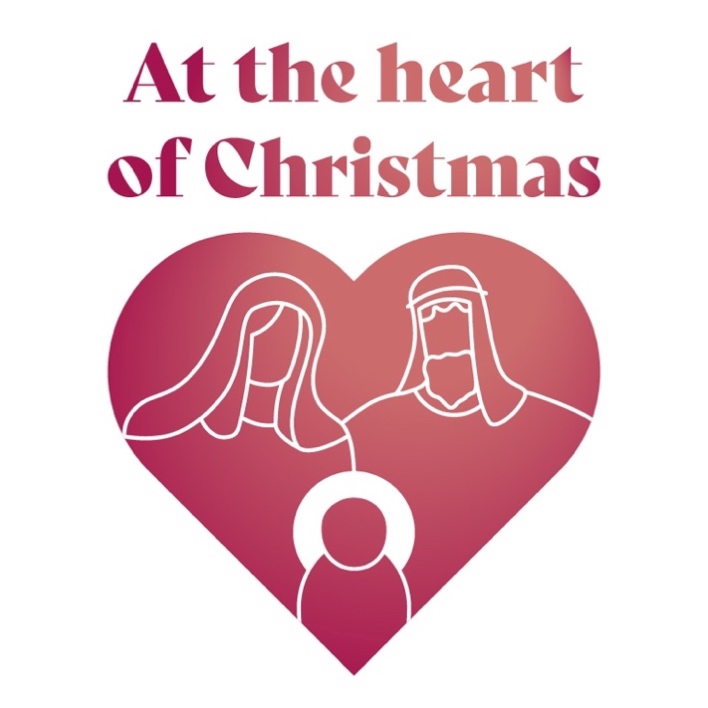
May God bless you richly throughout this holiday season. May God fill your life with love, joy and peace this Holiday Season and throughout the New Year. God bless you at Christmas and always. May His love surround you at Christmas time and always.
The newsletter will return early January.
